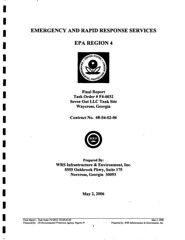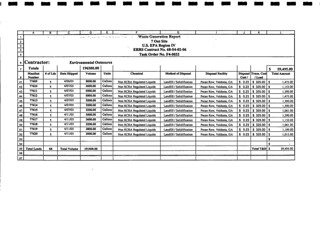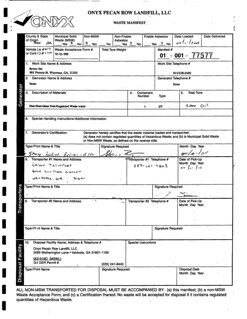What was in that waste water that went into landfill in an aquifer recharge zone, with surface runoff into the Withlacoochee River? The 44 shipments from the toxic waste site in Waycross to the Pecan Row landfill in Lowndes County were “Non RCRA Regulated Liquids”, but “PCBs are not defined as hazardous wastes” and according to the U.S. Department of Energy, “To be a hazardous waste, a material must first be a solid waste.” So “Non RCRA Regulated Liquids” apparently says nothing about hazard or toxicity.
 44 shipments went from the
“7 Out Site”
to “Pecan Row, Valdosta, GA” for $59,495.00 total
of your federal tax dollars paid to Veolia,
according to
pages 12 and 13
of
Final Report, Task Order # F-0032, Seven Out LLC Tank Site, Waycross, Georgia,
Contract No. 68S4-02-06
for
Emergency and Rapid Response Services, EPA Region 4,
Prepared By WRS Infrastructure & Environment, Inc.,
5555 Oakbrook Pkwy, Suite 175, Norcross, Georgia 30093,
May 2, 2006.
44 shipments went from the
“7 Out Site”
to “Pecan Row, Valdosta, GA” for $59,495.00 total
of your federal tax dollars paid to Veolia,
according to
pages 12 and 13
of
Final Report, Task Order # F-0032, Seven Out LLC Tank Site, Waycross, Georgia,
Contract No. 68S4-02-06
for
Emergency and Rapid Response Services, EPA Region 4,
Prepared By WRS Infrastructure & Environment, Inc.,
5555 Oakbrook Pkwy, Suite 175, Norcross, Georgia 30093,
May 2, 2006.
Is this where those PCBs in the landfill came from? EPA itself says, Are polychlorinated biphenyls (PCBs) regulated under RCRA as a hazardous waste?
PCBs are not defined as hazardous wastes (Memo, Weddle to Verde; May 18, 1984 (RCRA Online #12235)). However, it is possible that PCBs may be incidental contaminants in listed hazardous waste (e.g., solvent used to remove PCBs from transformers) or may be present in wastes that are characteristically hazardous. In these cases, wastes that otherwise meet a listing criteria or are characteristically hazardous are still subject to RCRA regulation regardless of PCB content.
However, to avoid duplicative regulation with Toxic Substances Control Act (TSCA), certain PCB containing wastes that exhibit the toxicity characteristic are exempt from regulation under RCRA (Monthly Call Center Report Question; September 1996 (RCRA Online #14014)). Section 261.8 exempts from RCRA Subtitle C regulation PCB-containing dielectric fluid and the electric equipment which holds such fluid if they satisfy two criteria. First, these PCB wastes must be regulated under the TSCA standards of Part 761. Second, only the PCB wastes which exhibit the toxicity characteristic for an organic constituent (waste codes D018-43) may qualify for the exemption (§261.8).
Apparently any liquid wastes from a Superfund site would be “Non RCRA Regulated Liquids”, according to U.S. DoE EH-231-034/0593 (May 1993), Exclusions and Exemptions from RCRA Hazardous Waste Regulation,

- any solid or dissolved material introduced by a source into a federally owned treatment work (FOTW) if certain conditions, described in Sect. 108 of the FFCA of 1992, are met;
- industrial wastewater discharges that are point source discharges regulated under section 402 of the Clean Water Act [§261.4(a)(2)]
If a Superfund site is not a federally owned treatment work, what is? And if the Seven Out site was not an industrial wastewater point source, what is?
 The Onyx Waste Manifests on pages 75-120
say the materials were “Non-Hazardous Non-Regulated Waste water”.
(Onyx became Veolia Environmental Services in 2005,
according to Veolia.)
As we’ve seen, “Non-Regulated” apparently means little.
We don’t know what was in that waste water
that went into a landfill
in a recharge zone for
the Floridan Aquifer, the source of our drinking water,
and
with surface runoff into the Withlacoochee River.
The Onyx Waste Manifests on pages 75-120
say the materials were “Non-Hazardous Non-Regulated Waste water”.
(Onyx became Veolia Environmental Services in 2005,
according to Veolia.)
As we’ve seen, “Non-Regulated” apparently means little.
We don’t know what was in that waste water
that went into a landfill
in a recharge zone for
the Floridan Aquifer, the source of our drinking water,
and
with surface runoff into the Withlacoochee River.
-jsq
